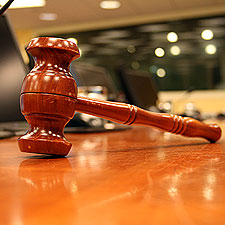
The judges apply the highest international legal standards to their work and issue judgements on the basis of the evidence the prosecution and defence put before them.
The Tribunal's judges have the solemn responsibility to determine the guilt or innocence of those accused of perpetrating war crimes in the former Yugoslavia, and to pass sentence on those whom they convict. In the course of a trial, they listen carefully to witnesses who testify in proceedings and examine forensic and other evidence presented in court. The judges apply the highest international legal standards to their work and issue judgements on the basis of the evidence the prosecution and defence put before them.
The ICTY judges come from a variety of legal systems and bring to the Tribunal a wealth of legal expertise and a rich diversity of experiences and perspectives. As required by the Tribunal's Statute, judges are persons of high moral character, impartiality and integrity who possess the qualifications required for appointment to the highest judicial offices, with experience in the fields of criminal law or international law, including international humanitarian law and human rights law.
The judges constitute one of the Tribunal's three main organs – the Chambers. The other two organs are the Office of the Prosecutor and the Registry.
The Chambers are organised into three Trial Chambers and an Appeals Chamber. They are assisted in their work by the Chambers Legal Support teams. They consist of numerous legal staff, employed by the Registry, who assist the judges in conducting research, helping them in preparing and managing cases, as well as in participating in the draft of legal documents.
Each Trial Chamber is composed of three permanent judges and a maximum of six ad litem judges. Ad litem judges are appointed by the UN Secretary-General at the request of the President of the Tribunal to sit on one or more specific trials, allowing for efficient use of resources in accordance with the court's changing caseload.
Three judges are assigned to hear each case, and at least one judge per case must be a permanent judge. Trial Chamber may be divided into sections of three judges each, composed of both permanent and ad litem judges. Individual sections have the same powers and responsibilities as a Trial Chamber.
The Trial Chambers must ensure that each trial is fair, expeditious, and conducted in compliance with the Tribunal's Rules of Procedure and Evidence, with full respect accorded to the rights of the accused and appropriate consideration given to the protection of victims and witnesses.
The Appeals Chamber consists of seven permanent Judges, five of whom are permanent judges of the ICTY and two of whom are permanent judges of the International Criminal Tribunal for Rwanda (ICTR). These seven judges also constitute the Appeals Chamber of the ICTR. Each appeal is heard and decided by a bench of five judges of the Appeals Chamber.
THE PRESIDENT AND THE VICE-PRESIDENT
The Tribunal's President and Vice-President are elected from among the ICTY judges.
The President of the Tribunal is elected by a majority of the votes of the permanent judges for a two-year term and is eligible for re-election once. The President presides over the proceedings of the Appeals Chamber and is also responsible for the assignment of judges to the Appeals Chamber and Trial Chambers. In addition, the President presides over all plenary meetings of the Tribunal, coordinates the work of the Chambers, supervises the activities of the Registry, and issues Practice Directions addressing detailed aspects of the conduct of proceedings before the Tribunal.
The President performs diplomatic and political functions related to the work of the Tribunal and supervises the Registrar in his or her role as the Tribunal’s channel of communication. The President is required under the Statute to submit an annual report on the activities of the Tribunal to the General Assembly as well as biannual assessments to the Security Council, setting out in detail the progress made towards the implementation of the Tribunal’s Completion Strategy.
The current President is Judge Carmel Agius, from Malta. He was appointed President of the Tribunal on 17 November 2015. He has been a Judge of the Tribunal since 2001 and he served as Vice-President from 2011 through 2015. His predecessors are:
Theodor Meron (USA; 2003-2005 and 2011-2015); Patrick L. Robinson (Jamaica; 2008-2011); Fausto Pocar (Italy; 2005-2008); Claude Jorda (France; 1999-2002); Gabrielle Kirk McDonald (USA; 1997-1999); and Antonio Cassese (Italy; 1993-1997).
The Vice-President is also elected from among the permanent judges by a majority of their votes. The Vice-President’s term coincides with the term of the President, and like the President, the Vice-President is eligible for re-election once. The Vice-President exercises the functions of the President in the event that the President is absent or unable to act and may sit as a member of the Trial or Appeals Chamber.
Judge Liu Daqun (China) was appointed Vice-President of the Tribunal on 17 November 2015. He has been a judge of the Tribunal since 2000.

